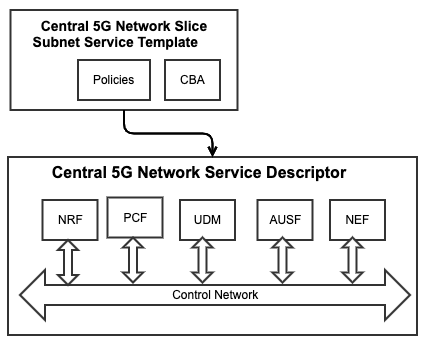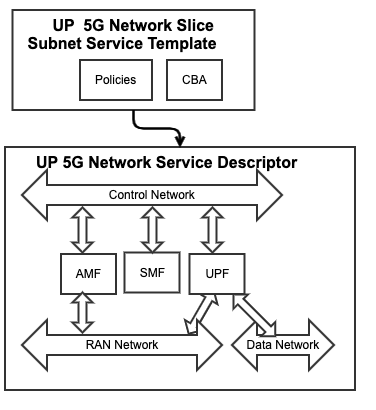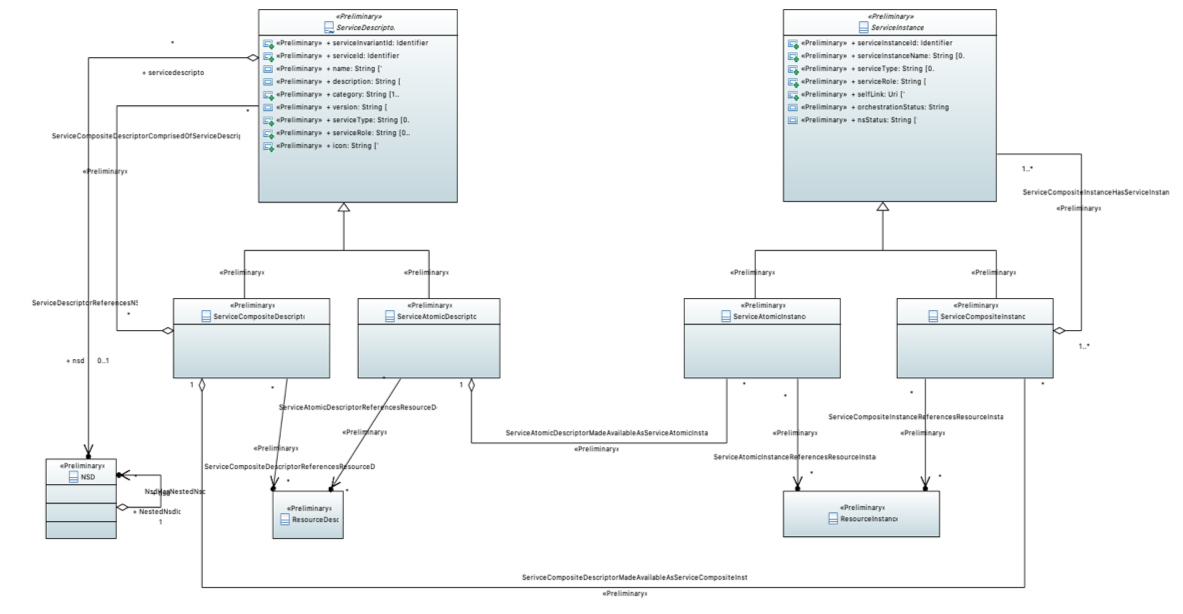The scope of this page is to explore the use of ETSI (Nested) Network Services model at Design Time and Run Time in the context of the Network Slicing.
The Guilin Service IM allows for a (nested) Network Service (NS) model that is referenced from an ONAP Service.
Since the NS can be composed VNFs, CNFs, PNFs and nested NSs, the ETSI NS model is well suited to describe the hierarchical structure of 3GPP Network Slice Subnets.
Design Time:




Design Sequence:
- Onboard 5G Core NFs (NRF, PCF, UDM, AUSF, NEF, AMF, SMF, UPF) into SDC
- Onboard RAN NFs (vCU, vDU) insto SDC
- In SDC, design a "Central" Network Service composed of
- "central" NFs (NRF, PCF, UDM, AUSF, NEF)
- Virtual Link (Control Network) for the SBA interface
- SAP(s) for all of the exposed entry points
- SDC distribute the resulting SOL007 NS package to the ETSI Catalog (and any one else interested, SO??)
- In SDC, design a "User Plane" Network Service composed of:
- "user plane" NFs (AMF, SMF, UPF)
- Virtual Link (Control Network) for the SBA interface
- Virtual Link (RAN Network) for the interface to the RAN components
- Virtual Link (Data Network) for the (external) data/internet interface
- SAP(s) for all of the exposed entry points
- SDC distribute the resulting SOL007 NS package to the ETSI Catalog (and any one else interested, SO??)
- In SDC, design a "RAN" Network Service composed of:
- "RAN" NFs (CU, DU)
- Virtual Link (Control Network) for the SBA interface
- Virtual Link (RAN Network) for the interface to the RAN components
- SAP(s) for all of the exposed entry points
- SDC distribute the resulting SOL007 NS package to the ETSI Catalog (and any one else interested, SO??)
- In SDC, design a "Complete" Network Service composed of:
- Scalable reference to the RAN NS
- Scalable reference to the UP NS
- Scalable reference to the RAN NS
- SDC distribute the resulting SOL007 NS package to the ETSI Catalog (and any one else interested)
- In SDC, Design a "Central" Service composed of
- A reference to the "Central" Network Service
- A CDS blueprint (CBA) for configuring the "Central" Service
- Behavioral policies for the "Central" Service
- SDC distribute the resulting "Central" Service package
- In SDC, Design a "User Plane" Service composed of
- A reference to the "UP" Network Service
- A CDS blueprint (CBA) for configuring the "UP" Service
- Behavioral policies for the "UP" Service
- SDC distribute the resulting "UP" Service package
- In SDC, Design a "RAN" Service composed of
- A reference to the "RAN" Network Service
- A CDS blueprint (CBA) for configuring the "RAN" Service
- Behavioral policies for the "RAN" Service
- SDC distribute the resulting "RAN" Service package
- In SDC, Design a "Complete" Service composed of
- A reference to the "Complete" Network Service
- A CDS blueprint (CBA) for configuring the "Complete" Service
- Behavioral policies for the "Complete" Service
- SDC distribute the resulting "Complete" Service package
Runtime
Starting state:
- SOL004 Packages for Central, UP and RAN NFs in the ETSI Catalog
- SOL007 Packages for Central, UP, RAN and Complete NSs in the ETSI Catalog
- Service Packages Central, UP, RAN, and Complete NSs in SO Catalog
- Policies available in DCAE
- CBAs in CDS
- VIM & CISM regions (NE, SE, S, C, N, NW, SW) in A&AI
- 6 RAN/UP Sites and one Central Site available and registered in A&AI
Instantiate nationwide eMBB Slice :
- CSMF(eMBB Nationwide) => NSMF (eMBB Nationwide Service Profile)
- NSMF creates eMBB Nationwide Slice Profile
- NSMF => NSSMF (eMBB Nationwide Slice Profile)
- NSSMF Matches eMBB Slice Profile to:
- NE (UP Network Slice Subnet Service, RAN Network Slice Subnet Service)
- SE (UP Network Slice Subnet Service, RAN Network Slice Subnet Service)
- S (UP Network Slice Subnet Service, RAN Network Slice Subnet Service)
- C (Central Network Slice Subnet Service)
- N (UP Network Slice Subnet Service, RAN Network Slice Subnet Service)
- NW (UP Network Slice Subnet Service, RAN Network Slice Subnet Service)
- SW (UP Network Slice Subnet Service, RAN Network Slice Subnet Service)
- NSSMF create Configuration data and Slice Profile for each instance:
- NE (UP, RAN)
- SE (UP, RAN)
- S (UP, RAN)
- C (Central)
- N (UP, RAN)
- NW (UP, RAN)
- SW (UP, RAN)
- NSSMF Instantiate Network Slice Subnet Instances:
- NSSMF => NSSMF (C)
- NSSMF (C, Central) => SO (Central Network Slice Service (C Parameters)
- SO => NFVO (Central Network Slice Network Service)
- NFVO works with VNFM(s) to Instantiate VNFs
- NSSMF configures Central VNFs(C eMBB data)
- NSSMF(C) registers C NSSI (Capacity Available, Capacity Allocated )
- NSSMF => NSSMF(NE, UP)
- NSSMF(NE, UP) => SO( UP Network Slice Service (NE Parameters))
- NSSMF => NSMF(NE, RAN)
- NSSMF(NE, RAN) => SO (RAN Network Slice Service (NE Parameters)
- ...
- NSSMF => NSSMF (C)
- Resulting Network Service Deployment:
-
- NSSMF registers Nationwide NSSI (Capacity Available, Capacity Allocated ) with A&AI
- NSMF registers Nationwide eMBB Slice
- CSMF completes
Resulting Instance info:

New Slice Request (NE Enterprise):
- CSMF(NE Enterprise) => NSMF (NE Enterprise Service Profile)
- NSMF creates NE Enterprise Slice Profile
- NSMF => NSSMF (NE Enterprise Slice Profile)
- NSSMF Matches NE Enterprise Slice Profile to:
- NE (UP Network Slice Subnet Service, RAN Network Slice Subnet Service)
- C (Central Network Slice Subnet Service)
- NSSMF create Configuration data and Slice Profile for each instance:
- NE (UP, RAN) Slice Profiles
- C (Central) Slice Profile
- NSSMF Identifies existing Network Slice Subnet Instances with enough capacity for NE Enterprise Slice Profile:
- NE RAN NSSI
- NE UP NSSI
- C Central NSSI
- NSSMF => NSSMF (C)
- NSSMF(C) configures Central VNFs(C NE Enterprise data)
- NSSMF(C) update C NSSI (Capacity Available, Capacity Allocated )
- NSSMF => NSSMF(NE, UP)
- NSSMF(NE, UP) configures NE, UP VNFs(UP NE Enterprise data)
- NSSMF(NE, RAN) updates NE RAN NSSI (Capacity Available, Capacity Allocated )
- NSSMF => NSMF(NE, RAN)
- NSSMF(NE, UP) configures NE, UP VNFs(UP NE Enterprise data)
- NSSMF(NE, RAN) updates NE UP NSSI (Capacity Available, Capacity Allocated )
- NSSMF registers NE Enterprise NSSI (Capacity Available, Capacity Allocated ) with A&AI
- NSMF registers NE Enterprise Slice
- CSMF completes
Resulting Instance info:



